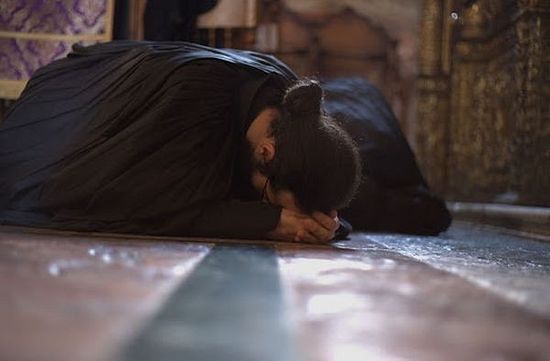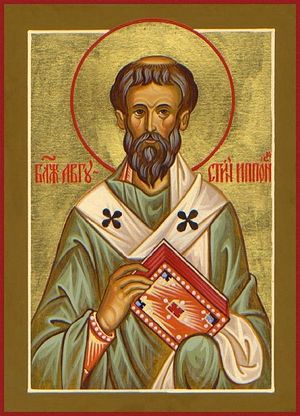Fifth Homily on the Lenten Season
Contained within the collection of homilies of St. Augustine of Hippo on the liturgical seasons is a series of seven “appropriately solemn” homilies offered at the beginning of the Lenten season in various years. In this series St. Augustine touches upon the classic Lenten themes of fasting, prayers, and almsgiving which enable us as Christians to enter upon the battle against the passions and for the virtues, such as humility and patience, which represent for us the taking up of our own crosses, and which we learn supremely from the Crucified Lord Himself. We offer here one of these sermons each day for the first week of Great Lent:
The solemn season has come which reminds us to humiliate our souls by prayer and fasting and to chastise our body to a greater degree than at other periods of the year. In reply to the questions as to why this season is observed at the approach of the solemnity of the Lord’s Passion and why its celebration is linked with the mystery of the number forty, since this information is wont to move some people, I have undertaken to set before you what our Lord deigned to give as a worthy answer to these queries. Furthermore, in the effort to find matter suitable to present, I am helped much by the faith and piety of those who, I know, seek this information, not in a controversial spirit, but in a sincere desire for knowledge.
The query is often posed as to why our Lord Jesus Christ, who, after assuming human nature and becoming man, showed Himself to men to furnish us an example of living, dying, and rising again, did not fast before but after He was baptized. For it is recorded thus in the Gospel: And when he had been baptized, he immediately came up from the water. And behold, the heavens were opened to him, and he saw the Spirit of God descending ... and coming upon him. And behold, a voice from the heavens said: “This is my beloved Son, in whom I am well pleased.” Then Jesus was led into the desert by the Spirit, to be tempted by the devil. And after fasting forty days and forty nights, he was hungry.[1] We, however, along with those who are to be baptized, fast before the day of baptism, which comes close to Easter, and we relax the fast for fifty days after Easter. Now, if it were permitted to baptize and to be baptized only on the very solemn feast of the Pasch, this arrangement would rightly be followed. But, since, through the bounty of Him who gave us power to become sons of God,[2] there is no prohibition in regard to the administration of baptism throughout the whole year according as anyone experiences the need or desire, and since we are permitted to celebrate the anniversary of the Passion of the Lord only on a particular day of the year, which is called the Pasch, then without a doubt the sacrament of baptism ought to be distinguished from the Pasch. For one is permitted to receive the sacrament on any day, but it is proper to celebrate the Pasch only on one definite day of the year. The sacrament is given to renew life; the Pasch is commended to the memory of one's piety. But, because a far greater number of candidates for baptism assemble on the Pasch, this day stands out, not because it is richer in the grace of salvation, but because the greater joy of the feast invites us.
What of the fact that even the baptism of John, which Christ then received, must be distinguished from the baptism of Christ Himself, which His followers receive, and that the baptism by which Christ was baptized is not better than that by which the Christian is baptized because Christ is better than the Christian, but, rather, that the baptism which is Christ’s is preferred to the other just because it is Christ’s? For John baptized Christ, although he acknowledged that he was inferior to Christ; but Christ, Who manifested Himself as greater than John, baptizes the Christian. In like manner, the mystery of the Resurrection of Christ, by which the Christian is circumcised for the destruction of the old, carnal life, so that he may hearken to the Apostle when he says: Just as Christ has risen from the dead through the glory of the Father, so we also may walk in newness of life,[3] is better than the circumcision of the flesh which no Christian now receives, although Christ received it. Likewise, the old Pasch which the Jews were commanded to celebrate by the slaying of a lamb is not, by reason of the fact that Christ celebrated it with His disciples, better than our Pasch on which Christ Himself was immolated. For it was in keeping with His desire to furnish us an example of humility and devotion that He, on coming to us, deigned to share in those symbolic mysteries by which His coming was foreshadowed, so that in this way He might indicate the great devotion with which we should receive these sacraments which proclaim that He has come. Therefore, it must not be believed that Christ laid down as a rule of regular observance that it is necessary to fast immediately after the reception of baptism, because He Himself fasted after having received the baptism of John. On the contrary, He clearly taught by His example that we must fast when we are engaged in a trying conflict with the Tempter. For Christ, Who deigned to be born as man, did not scorn to be tempted as man for this very reason, namely, that the Christian, thus instructed by his Master, might not be overcome by the Tempter. Therefore, man must fast when a similar struggle with temptation comes, whether it be immediately after baptism or after a considerable lapse of time, so that the body may discharge its military service by its discipline and the soul may gain a victory by its humiliation. Hence, in this precedent set by our Lord, the fast was occasioned, not by the immersion in the Jordan, but by the [anticipated] temptation of the Devil.
This is the reason why we fast before solemnizing the Passion of the Lord and why the relaxation of the fast is ended on the fiftieth day after Easter. Everyone who fasts with right dispositions either in a spirit of sincere faith humbles his soul in prayerful lamentation and in corporal penance, or directs his intention, raised above carnal enticement by a holy, spiritual delight in truth and wisdom, to the endurance of hunger and thirst.[4] Our Lord explained[5] both types of fasting to those who asked Him why His disciples did not fast. Concerning the first type which pertains to the humiliation of the soul, He said: The children of the bridegroom cannot mourn so long as the bridegroom is with them. But the hour will come when the bridegroom shall be taken away from them, and then they will fast. In regard to the other type of fasting which offers feasts for the mind, He went on to say: No one sews a patch of new cloth on an old garment, lest a greater rent be made. Nor do people pour new wine into old wineskins lest the skins burst and the wine be spilt. But they put new wine into fresh skins, and both are saved. Hence, because the Bridegroom has been taken away, we, the children of that beautiful Bridegroom, certainly must mourn. For He is beautiful above the sons of men: grace is poured abroad in his lips.[6] In the hands of His persecutors, however, He had neither beauty nor comeliness, and His life was taken away from this earth.[7] With reason do we mourn if we burn with desire for Him. They, indeed, were blessed who were permitted, before His Passion, to enjoy His presence, to question Him as they wished, and to listen to Him as it befitted them to listen. Before His coming, their fathers desired to see those days and did not see them, because they had been allotted their function in another dispensation; through them His coming would be predicted but He, on His advent, would not be heard by them. It was of them, that our Lord spoke when He said to His disciples: Many just men and prophets have longed to see what you see, and they have not seen it; and to hear what you hear, and they have not heard it.[8] In us, however, that other statement which He Himself likewise uttered has been fulfilled: The days will come when you will long to see one of these days and you will not be able to do so.[9]
Who would not be on fire with the flame of holy desires? Who would not mourn here? Who would not be afflicted in his sorrow? Who would not say: My tears have become my bread day and night, whilst it is said to me daily: Where is thy God?[10] Of course, we believe in Him as He sits at the right hand of the Father; nevertheless, as long as we are in the body we are exiled from Him[11] and we are unable to show Him to those who, in doubt and rejection, say: Where is thy God?[12] Rightly did the Apostle desire to be dissolved and to be with Him. However, Paul considered that to stay on in the flesh was not best for him, but necessary for us,[13] since the earthly habitation presseth down the mind that museth upon many things when the thoughts of mortal men are fearful and our counsels uncertain.[14]
The life of man upon earth, then, is a time of trial,[15] and in the night of this age the lion goes about seeking someone to devour,[16] not the lion of the tribe of Judah[17] our King, but the diabolic lion, our Adversary. Our King, however, portraying in Himself alone the four figures of animals mentioned in the Apocalypse of John, was born as a man, rendered service as a lion, was immolated as a calf, and flew upward as an eagle.[18] He flew upon the wings of the winds. And he made darkness his cover.[19] He appointed the darkness, and the night was made in which all beasts of the woods go about.[20] The roaring whelps of lions [mentioned in that same passage] are, to be sure, the tempters through whom the Devil seeks whom he may devour. Nevertheless, they have no power except over those whom they have ensnared, as is indicated by this passage which follows in the same psalm: seeking their meat from God. Who would not fear in the night of this world, a night so dangerous and so full of temptations? Who would not tremble in every bone lest he be judged worthy of being cast into the jaws of so cruel an enemy to be devoured? Therefore, we must fast and pray.
And when [would we fast and pray] with greater reason and with greater intensity than when the solemnization of the Lord's Passion is approaching, on which yearly celebration, the memory of that night is, in a certain manner, engraved on our minds lest it be destroyed by forgetfulness and lest that roaring beast find us sleeping, not physically, but spiritually? For what else did the Passion of our Lord, in the person of our Head, Christ Jesus, commend to us as calling for the greatest attention except the trial of this life? Hence, as the time of His death drew near, He said to Peter: Satan has desired to sift you as wheat: and I have prayed for thee, Peter, that thy faith may not fail; go and strengthen thy brethren.[21] And assuredly he did strengthen us through his apostolate, his martyrdom, and his letters. Furthermore, when he was admonishing us about the terrifying night of which I am speaking, he taught us how cautiously we should be on our guard, [using] the encouragement of prophecy as a night lamp, in the words: And we have the word of prophecy, surer still, to which you do well to attend, as to a lamp shining in a dark place, until the day dawns and the morning star rises in your hearts.[22]
Therefore, let our loins be girt about and our lamps burning, and we ourselves like men waiting for the master's return from the wedding.[23] Let us not say to one another: Let us eat and drink for tomorrow we shall die.[24] But for the very reason that the day of death is uncertain and the day of life is troublesome, let us fast and pray more earnestly for tomorrow we shall die. The Lord said:[25] A little while and you shall not see me, and again a little while and you shall see me. This is the hour of which He said: You shall be sorrowful, but the world shall rejoice, that is, this life in which we sojourn apart from Him is full of temptations. However, He goes on to say: But I will see you again, and your heart shall rejoice, and your joy no one shall take from you. We rejoice even now, however, trusting Him who is most faithful to His promises, waiting for that fuller joy to come when we shall be like to him, for we shall see him just as he is, and our joy no one shall take from us.[26] For we have received the Holy Spirit, the gracious and gratuitous pledge of this hope, who stirs up in our hearts the indescribable pains of holy desires. For we have conceived, as Isaias says, and we have brought forth the spirit of salvation.[27] And the Lord says: When a woman is in labor, she is sad because her day has come. But when she has brought forth the child, there is great joy because a man is born into the world.[28] This will be the great joy which no one will take from us, by means of which we shall be transferred to eternal light from this preliminary stage of faith. Let us now, therefore, fast and pray, since this is our day of labor.
The whole Body of Christ, diffused through the entire world, that is, the whole Church, practices penance as that corporate unity which says in the psalm: To thee have I cried from the ends of the earth; when my heart was in anguish.[29] Hence, light begins to dawn upon us as to why the Lenten season was inaugurated as the solemnity of this humiliation. For the [united Church] which cries from the ends of the earth when its heart is in anguish cries from those four regions of the earth which even the Scriptures often mention, that is, from the East and West, from the North and' the South. Through the entire area the Decalogue of the Law has been promulgated, not merely to be feared in its literal expression, but to be fulfilled in the grace of charity. Hence, when four has been multiplied by ten, we see the number forty rounded out. Yet, in the struggle with temptation, when there is pardon for sin, who fulfills perfectly the law, Thou shalt no covet?[30] For this reason, we must fast and pray, without, however, ceasing from good works. For such labor, that recompense called by the name of denarius is given eventually.[31] Moreover, just as ternarius receives its name from “three,” and quaternarius from “four,” so denarius comes from “ten.” This number, associated with forty, is given as a reward for labor. The representation of the number fifty signifies the period of rejoicing which no one will take from us. In this life we do not yet have any experience of this joy. Nevertheless, after the commemoration of our Lord's Passion, through the fifty days following His Resurrection on which we relax the fast, we proclaim this joy by singing “Alleluia” in the praises of the Lord.
Now, therefore, in the name of Christ, I exhort you, my dearly beloved brethren, to propitiate God by daily fasts, by more generous almsgiving, and by more fervent prayers so that you may not be overcome by Satan. Now is the time for husbands to practice self-restraint with their wives and likewise for wives to do so with their husbands so that both may have more time for prayer. And, as a matter of fact, they ought to do this on certain days throughout the entire year; the more frequently they do so, the better it will be, because he who greedily seeks privileges offends the one who has granted these privileges. Prayer is definitely a spiritual matter. Hence, it is more acceptable according as it fulfills more completely the demands of its nature. It is, moreover, poured forth from a more spiritual source in proportion as the soul which gives expression to it is raised above carnal desires.
For forty days Moses, the guardian of the Law, fasted; for forty days Elias, the most excellent of the Prophets, fasted; for forty days the Lord Himself, to whom both the Law and the Prophets gave testimony, fasted. Hence, it was in company with these two that He revealed Himself on the mountain. Let us, however, who are not able to perform this long fast, as they did, taking no nourishment for so many days and nights, at least do as much as we can, so that, with the exception of those days on which, for certain reasons, the law of the Church forbids us to fast, we may please the Lord God by daily or frequent fasting. But you do not think, do you, that as the fast from food and drink cannot be constant throughout so many days, so abstinence from marital pleasures cannot be continuous? When we see many persons of both sexes preserving inviolate, in the name of Christ, their bodies which have been consecrated to God, I think it is not a great accomplishment for chaste married persons to do during the entire Paschal season what virgins do throughout their whole life.
Truly, I have commended this practice [of fasting] to you as forcibly as I could, although I should not have to urge you since it is a time for humiliating one’s soul. Nevertheless, because of the errors of certain persons who, through their boastful enticements and vicious habits, unceasingly make me anxious in your regard, I cannot remain silent. There are certain observers of Lent who are voluptuous rather than religious; who seek out new delights in place of doing violence to old passions; who, by the lavish and costly preparation of various fruits, strive to surpass the variety and taste of all other dishes. They shun as unclean the vessels in which flesh has been cooked, but they do not shun the excesses of taste and appetite in their own flesh. They fast, not to lessen their usual gluttony by temperance, but to increase their immoderate desires by unusual variety. For, when the time for eating has come, they rush to well-laden tables as cattle to stalls. They tax their hearts and bloat their stomachs with too many courses, and lest their appetite should become jaded by the abundance, they stimulate it by various kinds of artfully prepared and exotic condiments. In a word, when fasting, they take so much to eat that they are not able to digest it.
There are people who do not drink wine so that they may seek out for themselves other liquors from the juice of other fruits, not for their health’s sake, but for pleasure, just as if Lent were not an observance of devout humility but an opportunity for new delights. If the weakness of one’s stomach cannot endure the drinking of water, how much more honorable it would be to sustain it by a moderate amount of the customary wine than to seek liquors which neither wine-dealer nor wine-press have ever seen, not so much for the purpose of choosing a more costly drink as of showing disapproval of a less expensive one? Moreover, what is more absurd, at this time when the flesh should be more closely held in check, than to obtain such great delights for it that the greediness of the appetite is loathe to have the season of Lent come to an end? What is more unseemly in these days of humiliation when all people ought to imitate the food of the poor, than to live in such a manner that, if one were to continue so to live throughout his whole life, the patrimonies of the rich would not be sufficient to support him? Be on your guard against these tendencies, then, my dearly beloved. Consider what is written: Go not after thy lusts.[32] If this most salutary precept ought to be observed at all times, how much more fully should it be carried out in these days when the relaxation of our desires in unusual pleasures is so discountenanced that even he who has not restrained his usual pleasures is rightly censured.
Be particularly mindful of the poor, so that what you take from yourself by living sparingly you may lay away in heavenly treasures. Let the needy Christ receive that of which the fasting Christian deprives himself. Let the self-restraint of the willing soul be the sustenance of the one in need. Let the voluntary neediness of the one possessing an abundance become the necessary abundance of the one in need. Let there be a merciful readiness to forgive in a conciliatory and humble soul. Let him who has done wrong seek pardon and let him who suffered the wrong give pardon, so that we may not be possessed by Satan who gloats over the disagreements of Christians. For this is a very profitable way of giving alms, namely, to cancel the debt of one's fellow servant so that one’s own debt may be cancelled by the Lord. The heavenly Master commended both deeds as good when He said: Forgive, and you shall be forgiven; give, and it shall be given to you.[33] Recall how that servant, whose entire debt had been cancelled by his master, received a double punishment because he did not show to a fellow servant owing him a hundred denarii the same mercy which he had received in regard to his debt of 10,000 talents.[34]
In this kind of good work, where good will is the sole requisite, there is no excuse possible. Some one may say: “I cannot fast without upsetting my stomach.: He may even say: “I wish to give to the poor, but I do not have the means to do so,” or I have so little that I run the risk of being in need myself if I give to others.” Even in these matters men sometimes make false excuses for themselves, because they do not find true ones. Nevertheless, who is there who would say: “I did not pardon the one seeking forgiveness from me because ill health prevented me,” or “because I had not a hand with which to embrace him”? Forgive, that you may be forgiven.[35] Here there is no work of the body; no member of the body is lifted up to help a soul, so that what is asked may be granted. All is done by the will; all is accomplished by the will. Act without anxiety; give without anxiety. You will experience no physical indisposition; you will have nothing less in your home. Now in truth, my brethren, see what an evil it is that he who has been commanded to love even his enemy does not pardon a penitent brother. Since this is so and since it is written in the Scriptures: Do not let the sun go down upon your anger,[36] consider my dear brethren, whether he ought to be called a Christian who, at least in these days, does not wish to put an end to enmities which he should never have indulged.
From The Fathers of the Church vol. 38: St. Augustine: Sermons on the Liturgical Seasons, (New York: Fathers of the Church, Inc.), 1959, pp. 97-108





